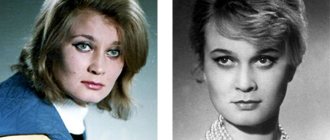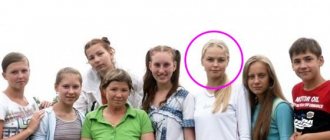Views: 224
Tatyana Peltzer is one of the most beloved Soviet actresses by the people, embodying for the viewer the image of a resilient old age. Her biography was stormy, and the path to fame took 40 years.
Tatyana Peltzer. Photo parodistov.net
Tatyana Ivanovna was born in Moscow on June 6, 1904. Father is the Russified German Ivan Romanovich Peltzer (Johann Robertovich by birth), mother is Esther Borukhovna , the daughter of a rabbi. After 2 years, they had another child - son Alexander. Ivan Peltzer was a well-known actor and teacher at that time, the creator of a private theater school, which trained such subsequently famous actors as Vladimir Volodin and Leonid Utesov . He became the only acting teacher for his daughter Tatyana (Alexander showed no interest in this profession). It is not surprising that she began performing on stage as a child, making her debut in the play “Kamo Gryadeshi” at the age of 9 years.
Ivan Peltzer with his daughter Tatyana. Photo showbiz.mediasole.ru
Biography
Tatyana Peltzer, half German and half Jewish, became, without exaggeration, a great Russian actress. “Happy old woman” - that’s what she called herself. Her personal life developed in such a way that there were no children or grandchildren, but the basis of the artist’s filmography is made up of films in which she is a mother, grandmother, and nanny.
View this post on Instagram
A post shared by ?NUMEROLOGIST (@tatiana_horoshilova) on Jan 25, 2018 at 2:33am PST
Actress Tatyana Peltzer
Even if Peltzer played a cleaner or a nurse, she was so kind, attentive and sincere that an ignorant person could not suspect her lack of parental experience. By the way, no one knows the exact number of films with Tatyana Ivanovna’s participation.
IVAN PELTZER
Ivan Peltzer in the films “The Sailor’s Daughter” (1941) and “Vasiok Trubachev and His Comrades” (1955)
Ivan Peltzer was born into a wealthy large family. His parents categorically did not accept his choice of acting profession, and therefore he studied it in secret from them. After training, Ivan moved for a long time from one provincial theater to another. When he returned back to Moscow, he was already a fairly famous comedian in the country.
Ivan’s love for the profession was so strong that he was ready to do it under any authority and under any conditions. At the end of his life he was seriously ill, but even then he continued to act in films and played a lot of charming old men.
Ivan found interesting things to do - he played on stage and in silent films, he made films and staged plays, he even organized an acting school in order to somehow feed his family during the hungry war and revolutionary years. And the children, Tanya and Sasha, were actively involved in all this from an early age.
Tatyana Peltzer with her father / Alexander Peltzer
Tatyana and her younger brother Alexander both grew up to be extraordinary people. From a very young age, she already learned how to make money through acting. Moreover, not only her father invited her to productions, but also other directors. But Alexander chose a different profession - he was attracted by speed. Peltzer was the creator of the first Zvezda racing car and worked as the chief engineer at a car production plant.
His fate was not very successful. One day he had a serious accident and was no longer able to walk. In his declining years, he found himself unnecessary to his wife and children, and Tatyana until the last took care of her brother, as she had cared for her father before.
Childhood and youth
The biography of People's Artist of the USSR, Stalin Prize laureate Tatyana Peltzer began on June 6, 1904 in Moscow in the family of the famous director and actor, who before the October Revolution made several films and acted in theaters. Ivan (Johann) Peltzer was not just a father for his daughter, but a teacher, mentor, and role model. He taught Tanya to look at the world vividly and to perceive life unexpectedly.
View this post on Instagram
A post shared by HISTORY IN PHOTOS AND VIDEOS (@retroalbom) on Feb 26, 2019 at 9:30pm PST
Tatyana Peltzer in childhood with her father Johann Robertovich
The actress’s maternal grandfather was the chief rabbi of Kiev. Mother Esther Borukhovna Roizen after her marriage began to be called Evgenia Sergeevna. In 1906, the Peltzers had a son, Alexander, who later became a famous designer, racing driver, and chairman of the Union of Soviet Karting Drivers. Before the start of World War II, the family spoke exclusively German.
Looking at her dad, the girl mastered the craft of acting. Tatyana played her first roles in his performances, and at the age of 9 she received her first fee for her role in the play “The Noble Nest.” She did not study acting professionally - the lack of education interfered with her career. Tatyana Ivanovna has changed many theaters. Recognition came late - at almost 50 years old.
Success on the verge of fainting and professional incompetence
Tatyana Peltzer played her first role at the age of 9 in the play “Kamo Gryadeshi” in Yekaterinoslavl. The second - in the production "The Noble Nest". She brought the little actress her first fee. And 10-year-old Tanya in the image of Seryozha from “Anna Karenina” was already making particularly sensitive spectators faint - so convincing was the scene of Anna’s farewell to her son and the little actress, whose main teacher was her father.
The Russified German Johann Robertovich called himself Ivan Rodionovich. The innkeeper's son, against his father's wishes, became an actor. Despite the fact that before the First World War the Peltzer family spoke German, Johann Peltzer managed to become a real Russian actor and pass on his love of theater to his daughter. Her father brought her into life and onto the stage, which became the meaning of life for her - even without professional education.
The Mobile Theater of the Political Department is the actress’s first theater. Nakhichevan, Yeysk and then Moscow. In 1923, Tatyana Peltzer was accepted into the troupe of the Theater of the Moscow Provincial Council of Trade Unions - the current Mossovet Theater. She didn’t manage to work there for long: the actress was fired with the wording “for incompetence.” She left, only to return to this stage almost a decade later, after working as a typist in a factory and being married to a German philosopher.
Theater
Tatyana Peltzer made her debut as a professional actress in 1916 in the enterprise of Nikolai Sinelnikov. Then there was the Mobile Theater of the Red Army in Yeisk. Soon, entries from the Kolkhoz Theater and the Navy Theater appeared in the actress’s work book. A few years later, Peltzer returned to the capital. In Moscow, she met the German communist Hans Tabler, married him in 1927, and 3 years later she and her husband left for Germany.
View this post on Instagram
A post shared by Hadjoh (@xadhox) on May 6, 2020 at 1:10pm PDT
Tatyana Peltzer in her youth
There Tatyana joined the Communist Party and got a job at the Soviet trade mission. In Berlin, a German director invited the actress to play in the play “Inga”. This was her only role in Germany, because in 1931 Tatyana Ivanovna returned to the USSR and entered the MGSPS theater (now it is the Mossovet Theater). An actress without education was included in the supporting cast.
Her relationship with the leadership of MGSPS did not work out: after 4 years, Peltzer was fired for professional unsuitability. In 1936, disappointed Tatyana moved to Yaroslavl, where she worked for 2 years in the oldest drama theater in Russia. Then she returned to Moscow and got a job at the newly opened Theater of Miniatures.
View this post on Instagram
A post shared by RETRO FM (@retro_fm) on Jun 6, 2020 at 6:03am PDT
Tatyana Peltzer in the theater
Tatyana Peltzer devoted 7 years to his stage. She played everyday roles of milkmaids, bathhouse attendants, and house manager. The actress laughed at her characters and at the same time loved them. It was difficult to make a career in the Theater of Miniatures, but over time Peltzer gained her own fans.
In 1947, Tatyana Ivanovna moved to the Moscow Academic Theater of Satire, which became her second home, the theater of life. The actress played with passion, and her fame came after her role as Lukerya in “Dowry Wedding.” In 1953, this production was filmed and shown in cinemas across the country. The audience appreciated Peltzer's talent - she woke up famous.
Tatyana Peltzer in the theater (still from the film-play “Three Girls in Blue”)
The actress's career flourished in the 70s. During this period, Tatyana Peltzer had many roles in the theater: Praskovya in The Old Maid, Marceline in The Marriage of Figaro, Aunt Tonya in Awake and Sing! and many others. Her heroines were close and understandable to the audience, she played easily and very vitally, but Tatyana Ivanovna was given such a game with great difficulty. The stage partners knew that she was lost as soon as her counterpart deviated from the text and began to improvise.
In 1972, Tatyana Peltzer was awarded the title of People's Artist of the USSR. This happened for the first time in the 48-year history of the Moscow Academic Satire Theater. In many ways, the actress was helped by Mark Zakharov, who staged five performances in this theater, where Peltzer played the main roles.
View this post on Instagram
A post shared by St. Nicholas Church in Chekhov (@nikola_rovki_hram) on Feb 20, 2020 at 7:56pm PST
People's Artist of the USSR Tatyana Peltzer
With the transfer of Mark Zakharov to Lenkom, the actress began to have problems. In 1977, after 30 years of work on the stage of the Moscow Academic Theater of Satire, she quit with a scandal and went to Lenkom.
Colleagues considered her leaving crazy, because not everyone could start over at an advanced age. For Zakharov, Tatyana Peltzer played an old woman in the play “Three Girls in Blue”, Clara Zetkin in the production of “Blue Horses”, Nadezhda Krupskaya in “Dictatorship of Conscience”. Her last role was in the play “Funeral Prayer.”
Long road to fame, Tatyana Peltzer in her youth
Tatyana's theatrical career did not work out in her youth. Perhaps her talent had not yet emerged at that time, or the lack of a classical education hindered her, but in her young years the actress changed many theaters. She began her independent theatrical activities in 1920 at the Yeisk Drama Theater. Then for several years she traveled around the country - Nakhichevan, Penza... In 1925 she was accepted into the troupe of the MGSPS (now the Mossovet Theater), where she served for 5 years before her departure to Germany with her husband, the German communist Hans Tabler. In 1931, Tatyana returned to Moscow and again got a job at the MGSPS theater in the supporting cast. After 3 years she was fired for incompetence...
Tatyana Peltzer in her youth. Photo aif.ru
Movies
Tatyana Ivanovna’s film debut was an episode in the comedy “The Wedding” in 1943. Then there was work in the drama “She Defends the Motherland.” The artist received her first major role in 1945 in the drama “Ordinary People.” Alas, the picture gathered dust on the shelves for 11 years, and Peltzer played unnoticeable episodes all this time.
Tatyana Peltzer (still from the film “Soldier Ivan Brovkin”)
Her roles in the comedies “Maxim Perepelitsa” and “Soldier Ivan Brovkin”, filmed in 1955, brought her success. Tatyana Ivanovna played the rural woman so brilliantly that she was dubbed “the mother of the Russian soldier.” In the film “Ivan Brovkin in the Virgin Lands,” the screenwriters wrote the role of Evdokia for her.
Tatyana Peltzer filmed a lot so that she would not be forgotten. She played mothers in the fairy tale "Morozko" and the comedy "Tiger Tamer", grandmothers in "Quarantine", "One, Two - Woe Never Matters!", a teacher in the film story "We Didn't Go Through This", a nurse in "Honeymoon", Baba -Yahu in “There, on Unknown Paths.”
Tatyana Peltzer as Baba Yaga (still from the film “There, on Unknown Paths...”)
Her characters often overshadowed the main characters in films. Take, for example, “The Adventures of the Yellow Suitcase,” where the 66-year-old actress climbs down a drainpipe and rides on the roof of a trolleybus. In the melodrama “You Never Even Dreamed of,” she does not have a completely positive image: the heroine reads other people’s letters, comes up with all sorts of excuses, just so that her beloved grandson does not get involved with a classmate.
More than one generation of viewers grew up on the stories of “Jumble” with the participation of Peltzer, on cartoons and radio shows in which Tatyana Ivanovna’s voice is heard. For example, “Three Fat Men”, “A Wolf and Seven Little Goats”, “The Adventures of a Little Brownie”, “Hedgehog Plus Turtle”.
The glory of the “collective farm mother”
In Moscow, it was not possible to get a job in the theater right away, and the actress left for Yaroslavl. After a year of passing roles, Tatyana Peltzer arrived in the capital, where the theater of miniatures was just opening. The new scene becomes creatively successful for her. She hosts concerts and creates poignant characters: house managers, milkmaids, nannies. Nearby are wonderful stage partners - Rina Zelenaya, Maria Mironova, Alexander Menaker.
Tatyana Peltzer gained fame at the Satire Theater after the release of the film version of the play “Dowry Wedding,” which was awarded the Stalin Prize. The old woman Lukerya Pokhlebkina, who was not averse to drinking a glass or two, was accepted by the audience as family. The actress received letters for a long time with various tips on how to get rid of a bad addiction, and became a popular favorite - at the age of 49.
Tatyana Peltzer, mother of Ivan Brovkin, passed for her in one of the villages in the Yaroslavl region where the film was filmed. Local old women fell in love with the actress, who created relatable and understandable images on the screen. After the comedy was released, Peltzer was dubbed “the mother of a Russian soldier,” or, as she herself said, “a collective farm mother.” For the film - the sequel to the film “Ivan Brovkin on Virgin Lands” - the role of “mother” was rewritten so as to become one of the central ones.
The older the actress became, the brighter her cheerfulness, energy, charm and optimism appeared in film images. “Tiger Tamer”, “Morozko”, “The Adventures of the Yellow Suitcase”, “You Never Dreamed of”, “After the Rain on Thursday”. The phrases of her heroines became catchphrases. “Repel! Definitely fight back!” — the viewer repeated after the aunt of the romantic landowner Alyosha from “Formula of Love.”
From the film “Morozko”
From the film “After the Rain on Thursday”
From the film “Formula of Love”
Personal life
In her youth, Tatyana did not shine with beauty such as to conquer men. However, a girl of average height with a rather large nose was distinguished by a magnetic look, not typical of Soviet artists, and an irrepressible character, nicknamed pioneer.
View this post on Instagram
A post shared by Seraphim Calendar (@calendar_serafima) on Jun 6, 2020 at 1:15am PDT
Tatyana Peltzer
The actress was a very well-read person, loved friendly parties, could insert a strong word and adored preference. In the card game, Leonid Bronevoy was her constant partner, and after the death of the celebrity, the special table went to her friend Olga Aroseva.
Peltzer married only once, to the German Hans Tabler. They lived together for 4 years and divorced because Tatyana fell in love with someone else and for some reason confessed this to her husband. The former spouses remained friends all their lives. Hans married a second time, but when he came to Moscow, he always went to visit Peltzer. Hans's son stayed in Tatyana Ivanovna's apartment more than once.
Published by Raisa Kolbasova Sunday, June 3, 2018
Tatyana Peltzer and Hans Tabler
Biographers have never found an answer to the question of how the woman, who, according to some sources, received German citizenship, managed to survive the period of repression, return to her previous surname and remain living in Moscow.
It was suggested that Peltzer agreed to cooperate with the NKVD, although this was not confirmed. And from the deportation to which the Germans living in the Union were subjected, Tatyana was saved by her colleagues Rina Zelenaya, Boris Andreev and Maria Mironova. They went to the Ministry of Culture and convinced officials of the artist’s trustworthiness.
View this post on Instagram
A post shared by Anastasia Danko, numerologist (@danko.anastasia) on Jun 6, 2020 at 1:43am PDT
Tatyana Peltzer in recent years,
the actress’s family has become her father and brother. Ivan Peltzer spent the last years of his life with her - his young wife kicked the man out the door. In 1959, a person dear to Tatyana passed away. She took this blow of fate hard. I also had to look after Alexander, who became disabled after the accident. His wife and children also abandoned him. My brother passed away in 1975.
The actress was in shape even in old age, she did exercises every morning, dressed beautifully and combed her hair. At 85, I ran a lot, smoked a lot and drank a lot of coffee. Tatyana Ivanovna did not want to listen to the doctors’ recommendations. On the screen she looked like a simple-minded, confused person, but in life she turned out to be a pedant and a neat person. I never ate in a canteen, even on tour I cooked myself. According to colleagues, working with Peltzer was difficult because she was overwhelming with her temperament and power.
Tatyana Peltzer - biography, personal life: What an actress she was, what an actress!..
Tatyana Ivanovna Peltzer (May 24 (June 6) 1904, Moscow - July 16, 1992, ibid.) - Soviet and Russian theater and film actress, People's Artist of the USSR (1972). Winner of the Stalin Prize, third degree (1951). Member of the CPSU since 1956. Source: https://fishki.net/1973178-6-ijunja-1904-goda-rodilas-aktrisa-tatjana-peltcer.html?mode=recent © Fishki.net
Advertising
Father Tatyana Peltzer was born into the family of a wonderful Russian actor and director, Honored Artist of the Republic Ivan Romanovich Peltzer. Yes, German by nationality, he managed to imbue himself with the real Russian spirit, become a real Russian actor and pass all this on to his daughter. Even before the revolution, Ivan Romanovich directed several films. After the revolution, he played in various theaters, acted in films (“A Lonely Sail Whitens,” “Bear,” “Big Life”), and was engaged in entrepreneurial and teaching activities. Her father became Tatyana’s first and only teacher. From her father, Tatyana Ivanovna inherited the invaluable gift of a living vision of the world, an unusual and always unexpected perception of life itself. They say that she was generally very similar to him, especially in temperament.
First roles in the theater Tatyana Peltzer played her first roles on stage in her father's plays. At the age of nine, she appeared in the role of Avdija in the play “Kamo is coming.” And for her work in the next production - “The Noble Nest” - she received a fee for the first time. In 1914, in a private enterprise in the city of Yekaterinoslavl, in the play “Anna Karenina,” Tatyana played Seryozha Karenin, and impressionable ladies were carried out of the hall without feelings: this is how the scene of Anna’s farewell to her son affected them. After the revolution, Tatyana worked first at the Mobile Theater of the Political Administration, and then on the provincial stage of Nakhichevan, Yeisk and other cities.
Germany In the late 20s, Tatyana Peltzer met the German communist and philosopher Hans Tabler, who came to Moscow to study at the Comintern School. She married him in 1927, and in 1930 the couple moved to Germany. There, Tatyana, at the request of her husband, joined the Communist Party of Germany and got a job as a typist at the Soviet Trade Representation. At that time, the famous director Erwin Piscator was working in Berlin. Piscator himself was a member of the KKE and looked at theatrical art as a tool for educating the masses. He periodically opened his theaters, aimed primarily at workers, but the authorities closed them. Just in 1930, in the working-class district of Berlin, in the premises of the Wallnertheater, he opened his third theater. Having learned that Frau Tabler was a former professional actress, he offered her a role in the play “Inga” based on the play by the Soviet playwright Glebov. It seemed that everything was going well, but with all the prosperity of life abroad, with all the love for her husband and even despite her own German roots, Tatyana could not stay outside her homeland for long. After living with Hans for a total of four years, she persuaded him to leave. She and her ex-husband remained friends throughout their lives. Hans married another woman, had a son with her, when the boy came to Moscow to study, he visited Tatyana Ivanovna, even lived with her for some time. Hans’s second wife was jealous of her husband towards Peltzer, expressed dissatisfaction with their correspondence, but could not completely break off the relationship between the former spouses. Tatyana Ivanovna never got married again. For many years her family was her father, Ivan Romanovich. He died in 1959. In recent years, after his young wife kicked him out, he lived with his daughter.
30s In 1931, Tatyana returned to the Soviet Union and again took her father’s surname - Peltzer. She got a job at the MGSPS Theater (now the Mossovet Theater). But her path to art was not easy. The actress, who does not have a professional theater education, was included in the supporting cast. She did not work there for long, and in 1934 she was fired “for incompetence.” Where could a 30-year-old woman with no education go? She again became a typist, getting a job at the AMO machine-building plant (later the Likhachev plant). The chief designer at the plant was her brother Alexander. By this time, he had already had a terrible life experience: while he was still studying at the Automobile Institute, he was convicted under Article 58 (“For counter-revolutionary activities”) and served two years. Over time, Alexander Peltzer became interested in the development of the first Soviet Zvezda racing cars, tested them himself, and became a three-time record holder of the Soviet Union. But in 1936, he left the post of chief engineer of AMO, as it is written in the archives, “due to leaving Moscow.” What caused this reason, and where Alexander Ivanovich went, is now also unknown. But 1936 is a time that speaks for itself... Tatyana Ivanovna also left the factory with him. She went to Yaroslavl to the oldest Russian drama theater named after F. Volkov.
Theater of Miniatures In 1938, Tatyana Ivanovna returned to Moscow, worked for two years in the same MGSPS theater and learned about the opening of the Theater of Miniatures. In 1940 she came to this theater and “settled” there for seven years. On the stage of the Miniature Theater, Tatyana Peltzer appeared in the wonderful company of Rina Zelenaya, Maria Mironova, Alexander Menaker, Natalia Nurm, Yuri Khrzhanovsky. It was fun and challenging - a new genre, there was almost no repertoire. Enthusiasts had to act by trial and error. There Tatyana Peltzer switched to everyday roles in small plays: the house manager, the milkmaid, the bathhouse attendant... The actress laughed at her heroines and at the same time loved them. “They have strong hands and good hearts,” she said. But even here Tatyana Ivanovna had a hard time. She was overshadowed by the stars Mironova and Zelyonaya, and it was not so easy to outplay them. Nevertheless, the actress had her first fans, they began to write letters to her, directors began to invite her to film episodes...
First roles in films In cinema, as in the theater, Tatyana Peltzer also did not have smooth sailing. She made her debut with a small role in the satirical comedy “Wedding” (1943), where the main roles were played by the famous Erast Garin
and
Faina Ranevskaya
, then appeared in the drama “She Defends the Motherland.” Tatyana Ivanovna played her first big role, Plaksina in the military melodrama “Ordinary People” by Grigory Kozintsev and Leonid Trauberg, in 1945. But this film ended up on the shelf for 11 long years and was released only in 1956. And the actress, meanwhile, again played passing episodes...
First roles in films In cinema, as in the theater, Tatyana Peltzer also did not have smooth sailing. She made her debut with a small role in the satirical comedy “Wedding” (1943), where the main roles were played by the famous Erast Garin
and
Faina Ranevskaya
, then appeared in the drama “She Defends the Motherland.” Tatyana Ivanovna played her first big role, Plaksina in the military melodrama “Ordinary People” by Grigory Kozintsev and Leonid Trauberg, in 1945. But this film ended up on the shelf for 11 long years and was released only in 1956. And the actress, meanwhile, again played passing episodes... Theater of Satire. National recognition In 1947, Tatyana Ivanovna moved to the Moscow Theater of Satire, which became her home for many years, the main theater of her life. She did not get lost in the chic troupe, entirely consisting of brilliant masters of the satirical workshop. Playing a lot and enthusiastically, Tatyana Ivanovna finally gets the role of Lukerya Pokhlebkina in the play “Dowry Wedding” by B. Ravenskikh. In 1953, the performance was filmed and released to cinema screens across the country. Her first national fame comes. At forty-nine years old... And how many tears and disappointments there were before that... “Mother of the Russian Soldier” After the film-play “Dowry Wedding” was released, Peltzer received all-Union love and wild popularity. Her roles in the comedies “Ivan Perepelitsa” and “Soldier Ivan Brovkin” (both 1955) brought her even greater success. In the film “Soldier Ivan Brovkin” the role of Evdokia, the main character’s mother, was given a small place. But how brilliantly Peltzer played her! She got used to the character so much that the old village women (the film was filmed in one of the villages in the Yaroslavl region) fell in love with her and accepted her as one of their own. After the release of this film, Peltzer was immediately dubbed “the mother of the Russian soldier” and awarded the title of Honored Artist. In the sequel, the film “Ivan Brovkin in the Virgin Lands” (1958), the role of Evdokia was written specifically for her.
Death
In the 80s, Tatyana Ivanovna began to forget herself as Alzheimer’s disease progressed. However, the actress stubbornly continued to go on stage and each time received a storm of applause, and her partners, including Alexander Abdulov, suggested her words. This couple had a special relationship. Peltzer appreciated talent and openness in her young colleague, and he showered her with only the two of them understandable compliments.
View this post on Instagram
A post shared by Lavry Kino (@lavry_kino) on Jun 6, 2020 at 12:23pm PDT
Tatyana Peltzer and Alexander Abdulov
Over time, the “beloved grandmother of the country” had to be treated in a psychiatric clinic. In 1992, Peltzer was again hospitalized with nervous strain. There, the actress managed to break her hip; at 88 years old, such a fracture is a disaster for a person.
On July 16, 1992, her housekeeper Annushka came to see her, as usual. She treated the bedsores, changed the bed and treated Tatyana Ivanovna to her favorite Marlboro cigarette. The actress happily smoked it all. Three hours later, the nurse informed the head physician of the clinic that Peltzer had died. The cause of death, as the media wrote, was pneumonia and heart attack.
There weren't many people at the funeral - it was summer, it was vacation time, the theaters were on tour. Flower sellers, having learned who the bouquets were intended for, gave them away for free. Tatyana Ivanovna’s grave is at the Vvedensky cemetery, next to her mother, father and brother.
View this post on Instagram
A post shared by Yulia Erofeeva (@ukka_erofeeva) on Sep 30, 2016 at 5:40pm PDT
Grave of Tatyana Peltzer
According to the artist’s will, the apartment went to her assistant Anna, who cared for Peltzer for 20 years, the books to her close friend Mark Zakharov, and the archive to the Lenkom Theater. The TV channel Culture dedicated the documentary film “Native Face” to the memory of the favorite of millions.
There is a legend that shortly before her death, the actress was asked to use her photo in a cigarette advertisement. Tatyana Peltzer noted:
“I once dreamed of having my portraits on posters. And now... as long as it’s not on toilet paper!”
Theater stage
Tatyana began her acting career on the theater stage at the age of 16 (1920). She became an employee at the Mobile Theater of the Political Department. But the girl didn’t work here for long. Tatyana changed jobs almost every year. And Peltzer was fired from the Mossovet Theater for incompetence. To earn a living, the girl was forced to work as a typist.
In Moscow, Tatyana moved in the circles of the German elite, where she met Tabler Hans, a young philosopher and communist from Germany. The young people had a romantic relationship, which resulted in a wedding in 1927. A couple of years later, the married couple moved to Berlin. In Germany, Tanya got a job at the USSR trade mission as a typist. The German director Piscator Erwin learned about the actress from the Soviet Union who had failed in her homeland and invited her to take part in his production called “Inga.”
Despite the fact that the girl knew the German language perfectly and was well acquainted with the customs in Germany, she missed her homeland. In this regard, strong family relationships began to crack. The divorce did not take long to happen. Tatyana returned to Moscow and regained her father's surname. Peltzer maintained friendly relations with her ex-husband for many more years.
Upon returning to her homeland, Tatyana Ivanovna again tries to take up acting and gets a job at the Theater. Mossovet. And again failure, leaving the theater in 1934. starts working at the AMO plant as a typist. Tatiana's brother Alexander worked at the same plant as chief engineer.
After several unsuccessful attempts to gain a foothold on the theater scene in Moscow, Peltzer decides to move to the city on the Volga, Yaroslavl. Here she was accepted into one of the oldest theaters in Russia. After 2 years, Tatyana left the theater again, this time of her own free will. The longing for my hometown Moscow took over again. The girl's return to Moscow coincided with the opening of the new Miniature Theater.
It was in this theater that the young actress worked for quite a long time - about 7 years. Tatyana played proletarian roles, working class people: cloakroom attendant, bath attendant, saleswoman, milkmaid. For a hereditary aristocrat and a girl with high self-esteem, such roles were not serious enough. But the girl did not reject a single offer to participate in productions, since she really loved the art of acting. Due to the lack of proper education, Peltzer's career progressed extremely slowly. Despite this, after 2-3 months of regular performances, the girl already had fans of her acting talent.
The real rise in Tatyana Ivanovna’s acting popularity was when she worked in the academic theater of satire (since 1947). Peltzer was so captivated by the performances that the theater atmosphere became like a second home for her. The actress experienced each role through herself and was completely imbued with the character’s character. It is not surprising that in a short time Tatyana received the long-awaited all-Union fame. The actress became famous after playing the role of the character Lukerya in the play “Dowry Wedding.” And since the performance was filmed, Tatyana simultaneously became a film actress - the performance was shown in all cinemas in the country.
The 70s became the peak of popularity in Peltzer's career. The most memorable roles were:
- Marceline - "The Marriage of Figaro";
- Aunt Tonya - “Rise and Shine”;
- Praskovya - "Old Maid".
As for the roles that were pleasing to the party elite, here the actress had regular incidents. Tatyana Ivanovna could forget the words of her character and in these cases she practiced improvisation.
Tatyana Ivanovna received the honorary title of People's Artist of the USSR in 1972. Not the least role in receiving the title was played by Mark Zakharov, who approved the actress for the main roles at the Academic Theater of Moscow. But after Zakharov moved to Lenkom, Peltzer did not find a common language with the new leadership. Tatyana Ivanovna also decides to transfer to Lenkom in order to resume her career at an already advanced age.
Filmography
- 1953 - “Dowry Wedding”
- 1955 — “Soldier Ivan Brovkin”
- 1955 — “Maxim Perepelitsa”
- 1964 — “The Adventures of Tolya Klyukvin”
- 1970 — “The Adventures of the Yellow Suitcase”
- 1972 - “Twelve Months”
- 1973 — “Acting”
- 1974 — “Aniskin and Fantomas”
- 1979 - “Accept a telegram on credit”
- 1980 — “Dulcinea Toboso”
- 1982 - “There, on unknown paths...”
- 1984 — “Red-haired, honest, in love”
- 1984 — “Formula of Love”
- 1985 - “After the Rain on Thursday”
- 1986 - “Who will enter the last carriage”
- 1989 — “Prince Luck Andreevich”
Creation
In 1938, the actress returned to Moscow and worked for two more years at the Mossovet Theater, then she was invited to the Theater of Miniatures, where Tatyana Ivanovna “stayed” for seven years.
In 1947, Peltzer went to work at the Satire Theater. She could not even imagine that this theater would bring her deafening fame and become a real “runway” for her. We recommend: Liya Akhedzhakova: filmography and personal life
Since 1943, she began to be invited to episodic roles in films. Soon the film “Dowry Wedding” was released, in which the actress played one of her most striking roles, appearing in the image of an unlucky, alcohol-abusing old woman.
This role made Peltzer incredibly popular. And the success of the subsequent film “Soldier Ivan Brovkin” only strengthened her fame. Tatyana Ivanovna had many admirers; now the entire Soviet Union knew her. Then the artist was already forty-seven years old.
Each of Peltzer's roles was filled with meaning. The actress put her whole soul into her characters. The audience was sure that in life the artist was exactly like her heroines. Peltzer was an amazing actress; she was able to transform into her heroines very easily, although in fact she had nothing in common with them.
Tatyana Ivanovna loved to dress beautifully, had excellent taste, and loved going to restaurants. The actress was a heavy smoker. Her loved ones simply begged her to get rid of this bad habit, but she claimed that it was part of her personality. The artist smoked a lot until the end of her life.










